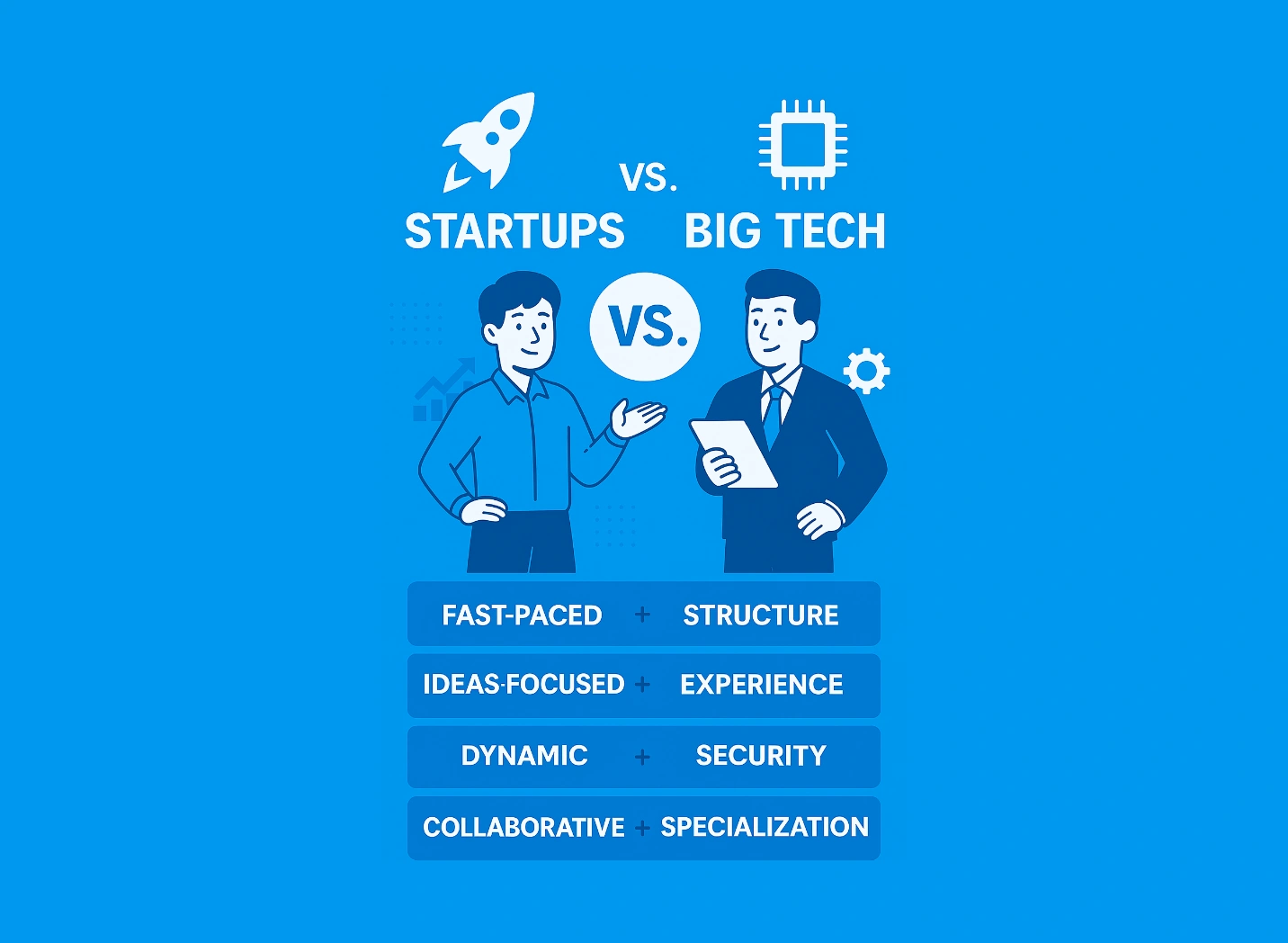Graduating with a computer science degree is a milestone worth celebrating. But after the cap and gown are put away, a looming question arises: Where should you start your tech career—at a startup or a big tech FAANG company?
This is more than just a job choice. It can shape how you grow as an engineer, what challenges you face early on, and even what kind of professional you become. Startups and big tech firms offer vastly different environments, opportunities, and expectations.
In this article, we’ll compare both paths across the dimensions that matter most to recent grads—mentorship, compensation, learning curve, impact, culture, career growth, and long-term trajectory. Whether you’re facing offers from both or just planning your job hunt, this breakdown can help you make a smart, confident decision.
Learning and Training: Who Teaches You How to Be an Engineer?
Big Tech
- Structured onboarding programs: Companies like Google, Microsoft, and Amazon have detailed, weeks-long onboarding programs with internal courses and ramp-up plans.
- Mentorship is built in: You’ll often be assigned a mentor or manager with formal training in supporting new grads.
- Scale of engineering systems is unparalleled: You might touch code that handles millions of users, or be exposed to massive distributed systems from day one.
- Tools and infrastructure are polished: You’ll learn “how the pros do it” at scale, with sophisticated CI/CD pipelines, monitoring, and team best practices.
If you’re looking to refine your CS fundamentals, pick up software architecture patterns, and build on a solid foundation, big tech is an excellent training ground.
Startups
- Sink or swim: Startups usually don’t have formal onboarding—you’ll learn by shipping code and solving immediate fires.
- Mentorship varies: At very early-stage startups, you might be the only engineer. At others, a senior dev might serve as your informal coach.
- Lots of hats: You’ll touch many parts of the stack and get very broad exposure—front-end, back-end, DevOps, maybe even customer support.
If you learn best by doing, and you’re excited to be scrappy and self-directed, a startup can accelerate your learning by brute force.
Job Responsibilities and Scope
Big Tech
- Clearly defined roles: You’ll work on a team with specific ownership areas (e.g., “Search ranking” or “Mobile checkout flow”).
- Code reviews and roadmaps: Project cycles may be weeks or months long. Collaboration and documentation are prioritized.
- Impact may feel abstract: Your code may serve billions, but you might only control a small feature or optimization.
Startups
- End-to-end ownership: You might be the engineer who builds it, ships it, monitors it, and fixes it at 2 a.m. if it breaks.
- Immediate impact: The code you push today may become a feature in production tomorrow.
- Fewer blockers: Want to implement a crazy new feature or refactor something painful? You might just get the green light.
Startups offer speed and ownership. Big tech offers specialization and depth.
Compensation and Equity
Big Tech
- High, stable compensation: FAANG and similar companies often offer total compensation (TC) exceeding $150,000–$200,000 even for new grads.
- Benefits packages are top tier: Expect generous health insurance, 401(k) matching, education stipends, and stock grants.
- Equity is typically liquid: Stock in public companies adds meaningful value and is relatively predictable.
Startups
- Lower salary (initially): Base pay can range from $60K to $120K, depending on funding stage and location.
- Higher equity upside: Founding engineers or early hires often receive meaningful equity, which may 10x in value or become worthless.
- Perks may be scrappier: Think startup swag, flexible hours, pet-friendly offices—but not necessarily robust benefits.
Startups are riskier but may offer outsized upside. Big tech offers stability and security.
Mentorship and Career Growth
Big Tech
- Formalized leveling: Roles are tied to levels (e.g., Software Engineer I, II, Senior) with clear criteria for promotion.
- Technical career ladders: You can grow as an individual contributor or become a manager, without leaving engineering behind.
- Internal transfers: Want to move from Android to ML infra? From Seattle to Zurich? Big tech offers internal mobility.
Startups
- Flat hierarchy: Everyone wears multiple hats, and titles may be fuzzy.
- Fewer “levels,” but faster growth: If you’re in a founding team or early-stage environment, you may become a tech lead or architect in 1–2 years.
Non-linear career paths: You might go from engineer → product → founder in a short span.
If you’re focused on rapid growth and decision-making early in your career, startups offer an accelerated track. If you want measured progression and structured evaluation, big tech provides a proven growth ladder.
Culture and Work-Life Balance
Big Tech
- Predictable hours (mostly): Standard 9–6 schedules, PTO, and WFH flexibility are common, though it varies by team.
- More meetings: With large orgs come planning docs, syncs, and approvals.
- Team diversity: You’ll likely work with designers, product managers, and engineers from around the globe.
Startups
- Fast-paced and demanding: Long hours during product launches aren’t uncommon.
- Direct access to leadership: Your desk may be next to the CEO’s.
- Mission-driven urgency: Everyone is aligned on goals, and sometimes survival.
Work-life balance may favor big tech, but startups may offer deeper fulfillment if you’re energized by hustle and impact.
Long-Term Career Impact
Big Tech
- Strong résumé signal: A stint at Google, Meta, Microsoft or Amazon opens doors for future roles—startups, VCs, grad schools, or launching your own business.
- Easy to specialize: You might become an expert in distributed systems, ML pipelines, or Android architecture.
- But… risk of stagnation: Without deliberate effort, you might grow slowly in a comfort zone.
Startups
- Breadth over depth: You’ll wear multiple hats—and learn product, design, customer empathy, and engineering all at once.
- Fast promotion cycles: High performers may grow faster than at larger companies.
- But… risk of burnout or instability: If funding dries up, the company pivots, or founders exit, your role may be at risk.
In both cases, the experience can be career-defining. The key is to be intentional about what you want to learn and how you want to grow.
SynergisticIT’s Perspective: Preparing You for Both Worlds
At SynergisticIT, we prepare learners for both environments—whether you’re aiming for a top-tier software engineering role or hoping to join a fast-moving startup team.
Here’s how our training aligns with each path:
| Startup Readiness | Big Tech Alignment |
| Build full-stack apps from scratch. | Master algorithmic thinking + system design |
| Learn cloud deployment, DevOps, and end-to-end pipelines | Gain fluency in scalable backend systems like Java + AWS |
| Handle ambiguity and problem-solving in real-world settings | Prepare for technical interviews, whiteboarding, and take-home tasks |
| Present business use cases, product thinking, and trade-offs | Communicate clearly in cross-functional, structured teams |
Our job placement program also works with a variety of employers, from agile startups building AI tools to Fortune 500 firms hiring engineers for global products. You’re not locked into one path—you’re empowered to explore either world with confidence.
So… Which Path Should You Choose?
Ultimately, the decision depends on your goals, preferences, and appetite for risk. Ask yourself:
- Do you prefer structure or speed?
- Are you more energized by scale or scrappiness?
- Do you want a strong brand name or more ownership early on?
- Do you thrive in teams or enjoy being a generalist?
If you’re still unsure, consider:
- Startups are ideal if you’re entrepreneurial, adaptable, and want fast growth through fire.
- Big tech is ideal if you want mentorship, brand value, and long-term learning in a structured environment.
And remember—you don’t have to choose forever. Many successful engineers start in big tech, then jump to startups. Others go the opposite route. What matters is making the most of where you are.
Final Thoughts
Startups and big tech companies aren’t better or worse—they’re simply different universes. As a fresh CS graduate, your first job is a launchpad, not a lifelong sentence. It should teach you how to be an engineer, help you build confidence, and open doors for future growth.
Whether you’re optimizing a database that serves millions or building the first prototype for an MVP, what matters most is showing up, learning quickly, and solving real problems.
Because no matter where you start, your tech career is yours to build—and every job can be the So… Which Path Should You Choose?
Ultimately, the decision depends on your goals, preferences, and appetite for risk. Ask yourself:
- Do you prefer structure or speed?
- Are you more energized by scale or scrappiness?
- Do you want a strong brand name or more ownership early on?
- Do you thrive in teams or enjoy being a generalist?
If you’re still unsure, consider:
- Startups are ideal if you’re entrepreneurial, adaptable, and want fast growth through fire.
- Big tech is ideal if you want mentorship, brand value, and long-term learning in a structured environment.
And remember—you don’t have to choose forever. Many successful engineers start in big tech, then jump to startups. Others go the opposite route. What matters is making the most of where you are.
Since 2010, SynergisticIT has helped 1000’s of job seekers thrive in the tech industry. At SynergisticIT, we make candidates work on technologies, skills and projects which Tech clients’ demand. Our candidates work at both startups and Big Tech. Post Completion of our Job Placement Program our candidates have the power to choose Clients rather than the other way around. So be it a startup or Big Tech, we have you covered.





